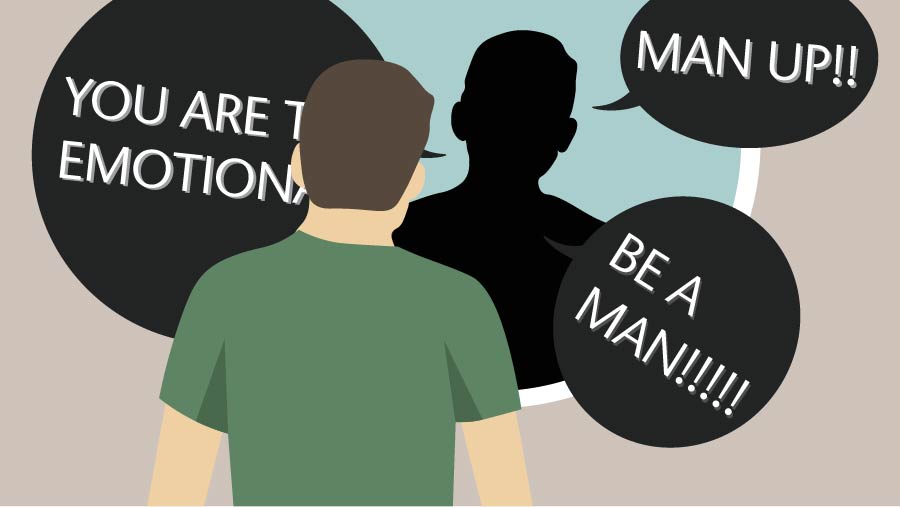
Meeting Men’s Mental Health Needs
By Tiffany Todd, LSW
Men’s mental health is an important topic that deserves attention, especially because many men suffer in silence. Only 40% of men with a mental health condition reported receiving treatment for their condition in the past year, and men are less likely than women to seek help for mental health difficulties, according to a 2019 study in the American Journal of Men’s Health.
Men are more likely to die by suicide than are women — in the U.S., the suicide rate for men is more than three times higher. In fact, suicide is the second leading cause of death for men aged 15 to 44. It’s important to recognize warning signs of suicidal behavior and seek help if needed. Please call 988, help is available.
Depression is a common mental health issue for men. About 6% of men in the U.S. experienced at least one major depressive episode in the course of a year, according to a 2019 study by the National Institute of Mental Health. However, men are less likely than women to seek treatment for depression.
Mental health issues can manifest differently in men.
While depression and anxiety are common mental health issues for both men and women, men more often experience symptoms as anger, irritability, and substance abuse. These symptoms may be seen as “masculine” behaviors, making it harder for men to recognize them as signs of distress.
Men may be more likely than women to use drugs and alcohol to cope. Men are more likely than women to report binge drinking (defined as consuming five or more drinks on one occasion) in the past month. Men may use drugs and alcohol to manage stress or anxiety, but substance abuse can worsen mental health issues over time. It’s important to recognize the signs of substance abuse and encourage men to seek help if needed.
Men often face unique challenges.
Men may feel pressure to be strong and stoic, and they can be hesitant to seek help for mental health issues due to stigma or a belief that it makes them look weak. Additionally, societal expectations around masculinity can create stress and anxiety. Men may be less likely to talk about their feelings. Men are often socialized to keep their emotions to themselves, which can make it harder for them to recognize when they need help. As a friend, family member, or healthcare provider, it’s important to create a safe and non-judgmental space where men feel supported in sharing their thoughts and feelings.
Some men face mental health challenges based on their life experiences.
For example, men who have experienced trauma or violence are at higher risk for developing post-traumatic stress disorder (PTSD). Men who have served in the military or worked in first responder professions may also face mental health challenges related to their experiences. Approximately 11-20% of veterans who served in Operations Iraqi Freedom and Enduring Freedom have PTSD in a given year, according to the U.S. Department of Veterans Affairs.
Men of different ages may have different mental health concerns.
For example, younger men may be more likely to struggle with anxiety related to social media or financial stress, while older men may be more likely to experience depression or isolation related to retirement or aging.
Men may benefit from different types of support.
Some men may prefer group therapy or peer support, while others may benefit from individual counseling or medication management. It’s important to work with a healthcare provider to identify the best course of treatment based on each individual’s needs.
Prevention is key.
Encouraging healthy behaviors and coping mechanisms can help prevent mental health issues from developing. This includes maintaining social connections, getting enough sleep, exercising regularly, and managing stress through techniques like mindfulness and meditation.
It’s important to recognize that mental health issues affect men as well as women, and that seeking help is a crucial step. Encouraging open dialogue and reducing stigma around mental health can help improve outcomes for everyone. By understanding these nuances of men’s mental health, we can better support men in maintaining their overall wellbeing and seeking help when needed.
Resources
HeadsUpGuys: This website provides information and resources for men who are dealing with depression. The site offers self-help tools, personal stories, and information on treatment options.
The Men’s Health Forum: This UK-based organization focuses on men’s health issues, including mental health. They offer a variety of resources, including a mental health toolkit, advice on how to talk about mental health, and information on where to get help.
Movember Foundation: This nonprofit organization aims to raise awareness and funds for men’s health issues, including mental health. It offers a variety of resources for men’s mental health, including a mental health resource center and a guide to supporting a friend who is struggling.
ManTherapy®: ManTherapy was created by a multidisciplinary team of suicidologists, mental health experts, marketing strategists, and creatives to make mental health approachable by using humor to break stigma and help men take action with tools and resources. The results of a 4-year, $1.2 million study funded by the CDC show that ManTherapy not only helps reduce depression, suicide risk, and poor mental health days, it also improves help-seeking behavior in working-aged men
Our therapists at InnerVoice in Chicago, IL and Skokie, IL are here to partner with you to reach your goals and improve your mental health.